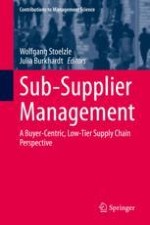2021 | OriginalPaper | Chapter
Sub-supplier Management and Sustainability
Author : Hedwig Maria Scharlipp
Published in: Sub-Supplier Management
Publisher: Springer International Publishing
Activate our intelligent search to find suitable subject content or patents.
Select sections of text to find matching patents with Artificial Intelligence. powered by
Select sections of text to find additional relevant content using AI-assisted search. powered by
